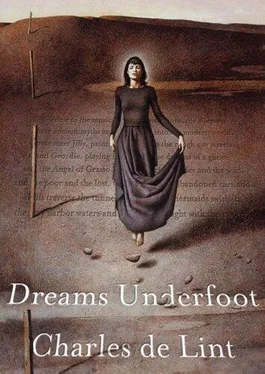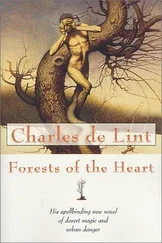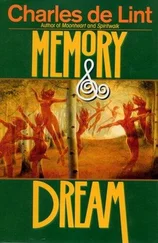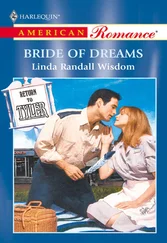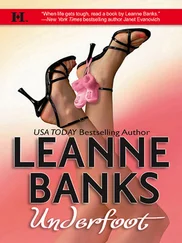Now, except for a pair of security guards who, Matt knew, would spend the night watching TV and sleeping in the park’s offices above the souvenir store, he had the island to himself. He turned back to look at the statue. It was still silent, still motionless, still watching the unfathomable waters of the lake.
He’d been here one afternoon and watched a bag lady feeding gulls with bits of bread that she probably should have kept for herself. The gulls here were all overfed. When the bread was all gone, she’d walked up to the statue.
“Our Lady of the Harbour,” she’d said. “Bless me.”
Then she’d made the sign of the cross, as though she was a Catholic stepping forward into the nave of her church. From one of her bulging shopping bags, she took out a small plastic flower and laid it on the stone by the statue’s feet, then turned and walked away.
The flower was long gone, plucked by one of the cleaning crews no doubt, but the memory remained.
Matt moved closer to the statue, so close that he could have laid his palm against the cool metal of her flesh.
“Lady,” he began, but he couldn’t go on.
Matt Casey wasn’t an easy man to like. He lived for one thing, and that was his music. About the only social intercourse he had was with the members of the various bands he had played in over the years, and even that was spotty. Nobody he ever played with seemed willing to just concentrate on the music; they always wanted to hang out together as though they were all friends, as though they were in some kind of social club.
Music took the place of people in his life. It was his friend and his lover, his confidant and his voice, his gossip and his comfort. It was almost always so.
From his earliest years he suffered from an acute sense of xenophobia: everyone was a stranger to him. All were foreigners to the observer captured in the flesh, blood and bone of his body. It was not something he understood, in the sense that one might be aware of a problem one had; it was just the way he was. He could trust no one—perhaps because he had never learned to trust himself.
His fellow musicians thought of him as cold, aloof, cynical—descriptions that were completely at odds with the sensitivity of his singing and the warmth that lay at the heart of his music. The men he played with sometimes thought that all he needed was a friend, but his rebuffs to even the most casual overtures of friendship always cured such notions. The women he played with sometimes thought that all he needed was a lover, but though he slept with a few, the distance he maintained eventually cooled the ardor of even the most persistent.
Always, in the end, there was only the music. To all else, he was an outsider.
He grew up in the suburbs north of the city’s center, part of a caring family. He had an older brother and two younger sisters, each of them outgoing and popular in their own way. Standing out in such contrast to them, even at an early age, his parents had sent him to a seemingly endless series of child specialists and psychologists, but no one could get through except for his music teachers—first in the school orchestra, then the private tutors that his parents were only too happy to provide for him.
They saw a future in music for him, but not the one he chose. They saw him studying music at a university, taken under the wing of some master whenever he finally settled on a chosen instrument, eventually playing concert halls, touring the world with famous orchestras. Instead he left home at sixteen.
He turned his back on formal studies, but not on learning, and played in the streets. He traveled all over North America, then to Europe and the Middle East, finally returning home to busk on Newford’s streets and play in her clubs.
Still the outsider; more so, perhaps, rather than less.
It wasn’t that he was unfriendly; he simply remained uninvolved, animated only in the presence of other musicians and then only to discuss the esoterics of obscure lyrics and tunes and instruments, or to play. He never thought of himself as lonely, just as alone; never considered himself to be a social misfit or an outcast from the company of his fellow men, just an observer of the social dance to which most men and women knew the steps rather than one who would join them on the dance floor.
An outsider.
A gifted genius, undoubtedly, as any who heard him play would affirm, but an outsider all the same.
It was almost always so.
In the late seventies, the current band was Marrowbones and they had a weekend gig at a folk club in Lower Crowsea called Feeney’s Kitchen—a popular hangout for those Butler University students who shunned disco and punk as well as the New Wave. The lineup was Matt on his usual bouzouki and guitar and handling the vocals, Nicky Doyle on fiddle, Johnny Ryan on tenor banjo, doubling on his classic Gibson mandocello for song accompaniments, and Matt’s longtime musical associate Amy Scallan on Uillean pipes and whistles.
They’d been playing together for a year and a half now and the band had developed a big, tight sound that had recently brought in offers for them to tour the college and festival circuits right across the country.
But it’d never happen, Amy thought as she buckled on her pipes in preparation for the selection of reels with which they were going to end the first set of the evening.
The same thing was going to happen that always happened. It was already starting. She’d had to listen to Nicky and Johnny going on about Matt earlier this afternoon when the three of them had gotten together to jam with a couple of other friends at The Harp. They couldn’t deal with the dichotomy of Matt offstage and on. Fronting the band, Matt projected the charming image of a friendly and outgoing man that you couldn’t help but want to get to know; offstage, he was taciturn and withdrawn, uninterested in anything that didn’t deal with the music.
But that was Matt, she’d tried to explain. You couldn’t find a better singer or musician to play with and he had a knack for giving even the simplest piece a knockout arrangement. Nobody said you had to like him.
But Nicky had only shaken his head, brown curls bobbing. “Your man’s taking all the craic from playing in a band.”
Johnny nodded in agreement. “It’s just not fun anymore. He’ll barely pass the time of day with you, but on stage he’s all bloody smiles and jokes. I don’t know how you put up with him.”
Amy hadn’t been able to come up with an explanation then and looking across the stage now to where Matt was raising his eyebrows to ask if she was ready, then winking when she nodded back that she was, she couldn’t explain it any better. She’d just learned over the years that what they shared was the music—and the music was very good; if she wanted more, she had to look for it elsewhere.
She’d come to terms with it where most people wouldn’t, or couldn’t, but then there was very little in the world that ever fazed her.
Matt started a Gdrone on his bouzouki. He leaned close to the mike, just a touch of a welcoming smile tugging the corner of his mouth as a handful of dancers, anticipating what was to come, stepped onto the tiny wooden dance floor in front of the stage. Amy gave him a handful of bars to lock in the tempo, then launched into the first high popping notes of “The Road West,” the opening salvo in this set of reels.
She and Matt played the tune through twice on their own and room on the dance floor grew to such a premium that the dancers could do little more than jig in one spot. Their elbows and knees could barely jostle against one another.
It wasn’t quite a sea of bobbing heads, Amy thought, looking down from the stage. More like a small lake, or even a puddle.
Читать дальше
